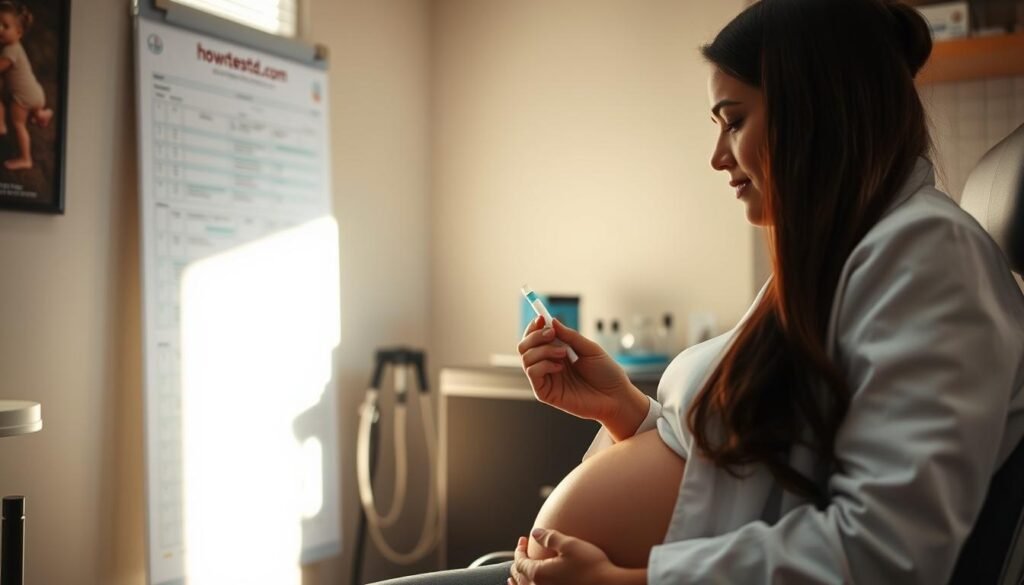Pregnancy STD Testing: Protecting You and Your Baby
Pregnancy is a time of joy and hope. But it’s also a time to focus on health. Many women don’t know they have an STD during pregnancy.
This can cause big health problems for both mom and baby.
It’s very important to take care of your health. Pregnancy doesn’t stop STIs. Prenatal STD screening is key for your health.
Testing helps you get the right treatment. This keeps you and your baby healthy. Don’t wait to get tested. It’s a big step for a healthy pregnancy.
Key Takeaways
- Pregnancy does not protect against STIs.
- Prenatal STD screening is a key part of prenatal care.
- Testing helps keep mom and baby healthy.
- Being proactive can stop serious health issues.
- STD testing is essential for a healthy pregnancy.
The Critical Role of STD Screening During Pregnancy
STD screening during pregnancy is very important. It helps keep both mom and baby healthy. Many STDs don’t show symptoms, so testing is key.
Protecting Two Lives at Once
STD testing is vital for two reasons. It keeps mom and baby safe. Untreated STDs can cause big problems.
They can lead to early labor, low birth weight, and even death. Early treatment can prevent these issues. This makes pregnancy and birth safer.
Expectant moms should take care of their health. Don’t delay getting tested. It’s a big step in protecting you and your baby.
The Window of Prevention
Early detection is key. It lets doctors treat STDs before they harm. This stops infections from reaching the baby.
It also helps mom feel better and lowers risks during pregnancy and birth. Most STIs don’t show symptoms. The only way to know is to get tested.
Regular testing is a smart move. It helps ensure a healthy outcome for both mom and baby.
Common STDs That Affect Pregnancy Outcomes
It’s important for pregnant women to know about STDs. These diseases can harm both mom and baby if not treated right away.
Bacterial Infections
Bacterial infections like chlamydia, gonorrhea, and syphilis are big worries during pregnancy. They can hurt the baby during birth or while in the womb.
Chlamydia and Gonorrhea
Chlamydia and gonorrhea are common STDs in pregnancy. If not treated, they can cause early labor, low birth weight, and infections in the baby. The Centers for Disease Control and Prevention says testing for these is key in prenatal care.
Syphilis
Syphilis can badly harm the baby if not treated. It can lead to birth defects, miscarriage, and death of the newborn. Pregnant women are tested for syphilis early on, and those at high risk are tested again in the third trimester.
Viral Infections
Viral infections like HIV, herpes, and HPV are also risks during pregnancy. They can pass to the baby during pregnancy, birth, or breastfeeding.
HIV and AIDS
HIV is a virus that can pass from mom to baby during pregnancy or birth. With the right treatment, the risk drops a lot. Pregnant women are tested for HIV as part of their care.
Herpes and HPV
Herpes and HPV are viral infections that can affect pregnancy. Though they can’t be cured, medicine can help manage symptoms and lower the risk of passing to the baby. It’s key for pregnant women to talk about their infections with their doctor.
Being proactive about your health is very important. Don’t delay getting tested. Early treatment of STDs can greatly improve pregnancy outcomes and keep mom and baby healthy.
STD Testing While Pregnant: Timing and Frequency
STD testing while pregnant is very important. It helps keep the mom and baby healthy. The tests are easy and don’t hurt much.
First Prenatal Visit Testing
All pregnant women should get tested for chlamydia, gonorrhea, syphilis, HIV, and hepatitis B. This is at the first or second prenatal visit. It’s key to find and treat infections early.
| STD | Testing Method | Importance |
|---|---|---|
| Chlamydia | Urine test or swab | Prevents neonatal conjunctivitis and pneumonia |
| Gonorrhea | Urine test or swab | Prevents neonatal conjunctivitis and complications |
| Syphilis | Blood test | Critical for preventing congenital syphilis |
Third Trimester Rescreening
Some say to test again for chlamydia and gonorrhea in the third trimester. This is for those at high risk or in areas with lots of infections.
Testing After Possible Exposure
If you might have been exposed to an STI, get tested again. This is true at any time during pregnancy. It keeps you and your baby safe.
It’s very important to take care of your health. Don’t wait to get tested. Prenatal STD screening is a big step in protecting your family’s future.
The Standard STD Testing Protocol for Expectant Mothers
Expectant mothers need to know about STD testing. It’s very important for their health and their baby’s. Don’t wait to get tested.
There’s a special set of tests for STDs. These tests help find diseases that could hurt the mom or baby.
Tests Included in Routine Prenatal Care
Expectant mothers get tested for important STDs. These tests are part of prenatal care. They check for:
- Chlamydia
- Gonorrhea
- Syphilis
- HIV
- Hepatitis B
These tests happen at the first visit. They help find health problems early.
| STD | Importance of Testing | Consequences if Untreated |
|---|---|---|
| Chlamydia | Early detection prevents transmission to the baby. | Can cause pneumonia or eye infections in newborns. |
| Gonorrhea | Critical for preventing mother-to-child transmission. | Can lead to blindness, joint infection, or life-threatening blood infection in newborns. |
Additional Tests for High-Risk Pregnancies
High-risk pregnancies need extra STD tests. This includes a history of STDs or many sexual partners.
Healthcare providers might test more often. They might also test for other STDs. This helps find and manage health risks.
“The importance of STD testing during pregnancy cannot be overstated. It’s a critical step in protecting both the mother’s and the baby’s health.”

Understanding Your Prenatal STD Test Results
Getting your prenatal STD test results can be scary. But knowing what they mean is very important for you and your baby. STD testing while pregnant is common. It’s key to know your results to take care of yourself.
Interpreting Positive Results
If your test shows you have an STD, it’s important to understand. A positive result means you have an STD. This can affect you and your baby.
Getting treatment right away is very important. It can help lower the risk of passing it to your baby.
Next Steps After Diagnosis
After finding out you have an STD, your doctor will tell you what to do next. You might need more tests to know how bad it is. They will talk about treatment options with you.
It’s very important to follow the treatment plan. This is to make sure you and your baby stay healthy.
| STD | Recommended Treatment During Pregnancy | Importance of Treatment |
|---|---|---|
| Chlamydia | Antibiotics | Reduces risk of transmission to the baby and pregnancy complications |
| Gonorrhea | Antibiotics | Reduces risk of transmission and complications such as preterm labor |
| Syphilis | Penicillin | Critical for preventing congenital syphilis and related complications |
It’s very important to take care of your health. Don’t wait to get tested. Knowing your test results and following treatment can help a lot during your pregnancy.
Safe and Effective STD Treatments During Pregnancy
Expectant mothers have good news. Many STDs can be treated safely during pregnancy. It’s key for pregnant women to get STD testing for pregnant women early.

Safe Medications and Therapies
Antibiotics treat bacterial infections like chlamydia and gonorrhea in pregnant women. “It’s so vital to be proactive about your health,” says experts. Antiviral meds also help with viral infections like HIV and herpes.
These treatments are picked to be safe for mom and baby. They follow STD testing guidelines for expectant mothers.
Treatment Timing and Success Rates
When to start STD treatment is very important. Early treatment lowers the risk of problems. So, sexually transmitted disease testing while pregnant is key in prenatal care.
Success rates are high with the right meds and following doctor’s orders. Pregnant women should stick to their treatment plan. They should also check in with their doctor to make sure the infection is gone.
“Do not put off getting tested,” is a mantra that cannot be stressed enough for expectant mothers. Prompt testing and treatment can make all the difference in ensuring a healthy pregnancy.
Preventing STD Transmission During Pregnancy
Safe sex and talking openly with partners are key. Expectant moms can protect their health and their baby’s.
Safe Sex Practices for Expectant Parents
Safe sex is vital during pregnancy. Using condoms correctly is very effective. It’s important to talk about STDs openly.
Abstinence or being with one partner who is not infected is best. But, for many, using protection is a good choice.
| Safe Sex Practice | Effectiveness | Additional Notes |
|---|---|---|
| Correct Condom Use | Highly Effective | Must be used correctly and consistently |
| Abstinence | Most Effective | Not feasible for all couples |
| Mutual Monogamy | Highly Effective | Both partners must be uninfected |
Partner Testing and Open Communication
Getting partners tested is key. Open communication helps make smart choices about health.
Pregnant women should ask their partners to get tested. Talking about it together can help keep everyone healthy.
The Impact of Untreated STDs on Fetal Development
STD testing during pregnancy is very important. Untreated infections can harm the baby’s growth. They can cause serious health problems for both mom and baby.
Potential Birth Complications
Untreated STDs can cause many problems during birth. Chlamydia and gonorrhea can make newborns sick with conjunctivitis and pneumonia. Syphilis can lead to serious issues like premature birth or congenital syphilis.
| STD | Potential Birth Complications |
|---|---|
| Chlamydia | Conjunctivitis, Pneumonia |
| Gonorrhea | Conjunctivitis, Pneumonia |
| Syphilis | Preterm Birth, Congenital Syphilis |
Long-term Health Consequences for Children
Untreated STDs can also harm children long-term. Kids born to moms with untreated syphilis might have delays or hearing loss. Some STDs might even affect their learning and behavior.
Don’t wait to get tested. STD testing during pregnancy is key to avoiding these issues. It helps ensure your baby’s health.
Insurance Coverage and Accessibility of Prenatal STD Testing in the US
Prenatal STD testing is very important for pregnant women. Insurance helps make it easier to get. It’s key to know what your insurance covers for prenatal care, like STD tests.
State-by-State Testing Requirements
How much insurance covers prenatal STD testing changes from state to state. Some states require it, while others don’t. For example, California and New York cover STD tests for pregnant women.
It’s important for pregnant women to know what their state requires. This helps them use their insurance right.
Resources for Uninsured Pregnant Women
Women without insurance can also get STD tests. Community health clinics and non-profits offer low-cost or free tests. The Health Resources and Services Administration (HRSA) helps fund these centers.
They provide prenatal care, including STD tests, for those without insurance. Pregnant women should look into these options for their health.
It’s very important to take care of your health. Don’t delay getting tested.
Conclusion: Protecting Your Future Family Through Proactive Testing
Getting tested for STDs while pregnant is very important. It helps keep both mom and baby healthy. This is the first step to a healthy family.
Knowing why STD testing during pregnancy is key is very important. It helps find and treat problems early. This greatly lowers the chance of serious issues.
Adding STD testing while pregnant to prenatal care is smart. It lets expectant moms take care of their health and their baby’s too.
Pregnancy and STD testing go hand in hand. Knowing the risks of untreated STDs helps women make better choices. This keeps them and their babies safe.
Don’t wait to get tested. Taking care of your health now means a healthier future for you and your family.
FAQ
Why is STD testing important during pregnancy?
STD testing is key during pregnancy. Many STIs don’t show symptoms. Testing helps find and treat them to keep mom and baby safe.
What are the risks associated with untreated STDs during pregnancy?
Untreated STDs can harm mom and baby. They might cause birth defects, low birth weight, and increase the risk of baby dying.
When should I get tested for STDs during pregnancy?
Get tested at your first prenatal visit. You might need another test in the third trimester, based on your risk and doctor’s advice.
What STDs are typically tested for during pregnancy?
Tests for chlamydia, gonorrhea, syphilis, HIV, and hepatitis B are common. Tests can change based on your risk and where you live.
How can I prevent STD transmission during pregnancy?
Use safe sex practices, get tested often, and make sure your partner is tested and treated if needed.
Are STD treatments safe during pregnancy?
Yes, safe treatments for STDs exist during pregnancy. These include antibiotics and antiviral meds approved for use during pregnancy.
Will my insurance cover STD testing during pregnancy?
Many insurances cover STD tests during pregnancy. But, coverage can differ. Always check with your insurance.
What happens if I test positive for an STD during pregnancy?
If you test positive, your doctor will talk about treatment with you. They’ll help you manage the infection and prevent passing it to your baby.
Can STDs affect my baby’s health?
Yes, untreated STDs can harm your baby. They might cause birth defects, developmental delays, and increase the risk of baby dying.
How can I find resources for STD testing and treatment during pregnancy if I’m uninsured?
If you’re uninsured, look for local health clinics, community health centers, and state programs. They offer free or low-cost STD testing and treatment.


